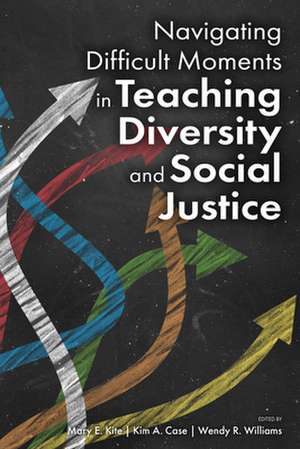Navigating Difficult Moments in Teaching Diversity and Social Justice
Autor Mary E. Kite, Kim A. Case, Wendy R. Williamsen Limba Engleză Paperback – 9 noi 2020
Preț: 298.02 lei
Nou
Puncte Express: 447
Preț estimativ în valută:
57.02€ • 59.70$ • 47.19£
57.02€ • 59.70$ • 47.19£
Carte disponibilă
Livrare economică 15-29 martie
Preluare comenzi: 021 569.72.76
Specificații
ISBN-13: 9781433832932
ISBN-10: 1433832933
Pagini: 274
Dimensiuni: 152 x 229 x 15 mm
Greutate: 0.42 kg
Editura: Wiley
ISBN-10: 1433832933
Pagini: 274
Dimensiuni: 152 x 229 x 15 mm
Greutate: 0.42 kg
Editura: Wiley
Cuprins
Preface
Faye Crosby
1: Pedagogical Humility and Peer Mentoring for Social Justice Education
Kim A. Case, Mary E. Kite, and Wendy R. Williams
2: Ground Rules for Discussing Diversity: Complex Considerations
Susan B. Goldstein
3: Social Justice Burnout: Engaging in Self-Care While Doing Diversity Work
Asia Eaton and Leah R. Warner
4: Mistakes Were Made by Me: Recovering When an Instructor’s Error Affects Classroom Dynamics
Mary E. Kite, Samuel M. Colbert, and Scott M. Barrera
5: When the Professor Experiences Stereotype Threat in the Classroom
Desdamona Rios, Kim A. Case, Salena M. Brody and David P. Rivera
6: Becoming a Target: Anonymous Threats While Teaching Diversity Courses or Working on Social Justice Issues
Lisa S. Wagner and J. J. Garrett-Walker
7: Inclusion–Exclusion: Balancing Viewpoint Diversity and Harmful Speech in the Multicultural Classroom
Salena M. Brody and Darren R. Bernal
8: The Efficacy Paradox: Teaching About Structural Inequality While Keeping Students’ Hope Alive
Lisa M. Brown
9: Emotionally Charged News in the Classroom
Ryan M. Pickering
10: Raising the Consciousness of Students Holding Ingroup Stereotypes
Lisa M. Brown and Wendy R. Williams
11: White Privilege in the Classroom
Leah R. Warner, Lisa S. Wagner, and Patrick R. Grzanka
12: Navigating Difficult Moments Outside the Classroom
Wendy R. Williams and F. Tyler Sergent
13: Contemporary Issues in Terminology: Using Gender-Inclusive Language to Create Affirming Spaces
Amanda J. Wyrick
14: Aging as an Element of Diversity: Best Practices for Challenging Classroom Conversations and Avoiding Ageism
Lisa S. Wagner, Tana M. Luger and Matthew Calamia
15: Outsiders Teaching Insiders: How Instructors From Privileged Groups Can Effectively Teach About Diversity
Susan B. Goldstein
16: When Students Frame Prejudicial Speech as “Freedom of Speech”: Classroom and Institutional Implications
Leah R. Warner
17: Student Evaluations of Teaching: Can Teaching Social Justice Negatively Affect One’s Career?
Guy A. Boysen
18: Flotsam and Jetsam: Staying the Course While Navigating Difficult Moments in Teaching Diversity and Social Justice
Wendy R. Williams, Mary E. Kite, and Kim A. Case
Faye Crosby
1: Pedagogical Humility and Peer Mentoring for Social Justice Education
Kim A. Case, Mary E. Kite, and Wendy R. Williams
2: Ground Rules for Discussing Diversity: Complex Considerations
Susan B. Goldstein
3: Social Justice Burnout: Engaging in Self-Care While Doing Diversity Work
Asia Eaton and Leah R. Warner
4: Mistakes Were Made by Me: Recovering When an Instructor’s Error Affects Classroom Dynamics
Mary E. Kite, Samuel M. Colbert, and Scott M. Barrera
5: When the Professor Experiences Stereotype Threat in the Classroom
Desdamona Rios, Kim A. Case, Salena M. Brody and David P. Rivera
6: Becoming a Target: Anonymous Threats While Teaching Diversity Courses or Working on Social Justice Issues
Lisa S. Wagner and J. J. Garrett-Walker
7: Inclusion–Exclusion: Balancing Viewpoint Diversity and Harmful Speech in the Multicultural Classroom
Salena M. Brody and Darren R. Bernal
8: The Efficacy Paradox: Teaching About Structural Inequality While Keeping Students’ Hope Alive
Lisa M. Brown
9: Emotionally Charged News in the Classroom
Ryan M. Pickering
10: Raising the Consciousness of Students Holding Ingroup Stereotypes
Lisa M. Brown and Wendy R. Williams
11: White Privilege in the Classroom
Leah R. Warner, Lisa S. Wagner, and Patrick R. Grzanka
12: Navigating Difficult Moments Outside the Classroom
Wendy R. Williams and F. Tyler Sergent
13: Contemporary Issues in Terminology: Using Gender-Inclusive Language to Create Affirming Spaces
Amanda J. Wyrick
14: Aging as an Element of Diversity: Best Practices for Challenging Classroom Conversations and Avoiding Ageism
Lisa S. Wagner, Tana M. Luger and Matthew Calamia
15: Outsiders Teaching Insiders: How Instructors From Privileged Groups Can Effectively Teach About Diversity
Susan B. Goldstein
16: When Students Frame Prejudicial Speech as “Freedom of Speech”: Classroom and Institutional Implications
Leah R. Warner
17: Student Evaluations of Teaching: Can Teaching Social Justice Negatively Affect One’s Career?
Guy A. Boysen
18: Flotsam and Jetsam: Staying the Course While Navigating Difficult Moments in Teaching Diversity and Social Justice
Wendy R. Williams, Mary E. Kite, and Kim A. Case
Notă biografică
Descriere
Examines challenges that arise for educators teaching social justice and diversity-related courses and offers best practices for addressing them. Contributors cover issues such as incorporating current events related to social justice into classroom discussion, navigating one's own stigmatized or privileged identities, and dealing with bias.
